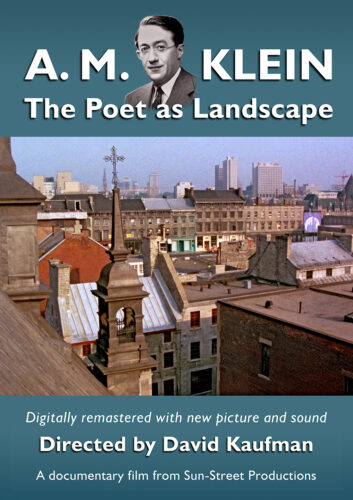Before Leonard Cohen and Irving Layton, there was Abraham Moses Klein. Klein, who was born in Ukraine in 1909 and came to Canada with his family as an infant, eventually became the leading Anglo-Jewish literary voice of the mid-twentieth century and one of Canada’s most important modern poets. Though raised in an Orthodox home, and with early thoughts of serving his community as a rabbi, Klein found his literary calling as a student at McGill University where he met and befriended F. R. Scott, A. J. M. Smith, and other members of the Montreal Group of Poets, eventually taking his place among them.
In a life marked by intense work and ambition, Klein wore many hats—poet, novelist, journalist, community activist, Joycean scholar, lawyer by training—and his strong cultural identification as a Jew permeated all these activities and informed his lifelong pursuits. As editor and columnist of the Canadian Jewish Chronicle from 1932 to 1955, Klein lived through and wrote extensively about the most turbulent era in modern Jewish history, becoming the foremost exponent of Canadian Jewry for more than two decades. A keen observer of politics, he foresaw the threat of Hiltlerism, and expressed eloquently in his writing the despair of the community during the Holocaust and its subsequent exultation at the founding of the state of Israel.
Through interviews, historical stills, and film footage with selections from his poetry and prose, the documentary offers insights into Klein’s personality and his place in his beloved Montreal. The film explores Klein’s writing, his political activism, his fascination with Joyce, and his deep affection for French Canada as expressed in his most famous book, The Rocking Chair. The interviewees include Klein’s lifelong friend David Lewis and his wife, Sophie, poet Irving Layton, literary critic Leon Edel, Yiddish scholar Ruth Wisse, historian David Rome, and law partner Max Garmaise. Also appearing in the film is one of Klein’s sons, Colman, who paints an intimate portrait of his father and speculates about the depression that overtook Klein just a few years after he won the Governor-General’s award for poetry in 1948. The onset of this illness led to a profound silence that encompassed the poet until the end of his life in 1972.
(Please note: This is a digitally remastered version of the 1978 release, with reprocessed picture and sound. The original 16mm colour negative was scanned in 4K resolution by Frame Discreet of Toronto and is being released in an HD version on this site. A 4K version can be licensed for institutional or public screenings.)
Year of Release: 1978; Digital Remaster: 2023
Running Time: 58 minutes
Production Company: Sun-Street Productions
Production Format: 16mm colour negative film
Available formats: High-Definition MP4 digital files, DVD
CREDITS:
Produced and directed by
DAVID KAUFMAN
Script Consultant
USHER CAPLAN
Director of photography
RODNEY CHARTERS
Edited by
STEPHEN LAWRENCE and DAVID KAUFMAN
Sound Recording
DON BOOK, JOHN GUNDY, BRENT HALISKIE
Sound Editing
DAVID APPLEBY
Assistant Producer
PATRICK MASTERSON
Assistant Director
DAVID HILLEL
Visual Research
ANNE EPSTEIN
Music composed and performed by
CYNTHIA MOSELEY, ALBERT KUSSIN, LYNDAMAE HARRIS
Readings from A. M. Klein by
EARL PENNINGTON
PRAISE FOR A. M. Klein: The Poet as Landscape
“It’s a rare but real pleasure to be ‘knocked out’ by somebody’s first film. David Kaufman’s documentary on the Canadian poet A.M. Klein is a stunning work, with none of the weaknesses usually noticeable in novice films. In fact, A. M. Klein: The Poet As Landscape could rank with some of the work of Donald Brittain, the veteran Canadian documentarist. Kaufman reveals a similar painstaking attention to subtle details in the soundtrack, the same respect for the poetic potential within a voice-over narration, and an eye for visuals which work in counterpoint to words….
…A. M. Klein: The Poet As Landscape is a powerful affirmation of life and an eloquent portrait of a poet who cared so deeply about people and community. This film deserves, and will surely receive, wide exposure. The thorough research, excellent craftsmanship, and passionate commitment which created it have made this documentary an extremely memorable and moving experience, unique among current filmmaking efforts.”
Joyce Nelson, Cinema Canada, February 1978

